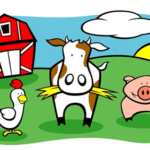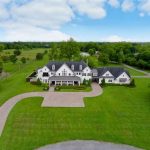
Financing the Rural Lifestyle
If your dream is living in the country, there are a few extra considerations that come into play when we talk about financing a rural property purchase. It is important to understand some of these nuances to know what type of property to be looking at to suit your budget and financing options. For many, we dream of owning a quarter section of land, with a log home tucked away in the woods but that doesn’t mean that this type of property is easy to get a mortgage for so before you fall in love with a home, let’s explore some of the rules and restrictions which may require some planning before purchasing.
Buying Raw Land
If your plan is to pick up a parcel of vacant land and build your dream home, be prepared for a higher down payment requirement. Raw land purchases require commonly in the 35% – 50% down payment category depending on the use, location, province and size of the property. A 1 acre parcel close to the city for example, might require only 35% down, whereas 80 acres of farm land will require more like 50% down. Raw land loans also typically come at higher interest rates than traditional residential housing loans.
Building on your land
Once you own the land and want to build there are a few different ways this can be done. The first is a self build – you will be hammering away on those walls yourself, or self managing contractors and trades to come in and complete the build. This will require a self build draw mortgage which is not a common mortgage to obtain. You will be very limited in the number of lenders available for this type of financing. You will also require quite a bit of cash up front to get the project off it’s feet. In self builds, there are certain items the mortgage funds will not finance like bringing in utilities and digging a well for example.
The second is a builder draw mortgage. This is where you hire a builder who does everything for you. There are a few more lenders doing these types of financing but there are some restrictions in place to be aware of.
Draw mortgages are advanced in stages during the build to help finance the cost of the build as you go, but due to the added work and risk to the lender you will not find as much flexibility in the interest rate. Some lenders will lock in the rate at the first draw, while others will charge one rate during the build and then convert the rate to the going rate at the time of completion. There are certainly some nuances with a draw mortgage, like set up fees and inspection costs to be aware of up front.
The third option is a completion mortgage, this is the most common style of mortgage for building new homes on city lots. This is where the builder picks up the lot, builds the house for you and takes your down payment up front as security. You obtain a mortgage when the project is completed and pay in full on possession day. These are not as common on rural property purchases, but do occur in some acreage subdivision scenarios.
Well/Cistern and Septic
One thing to keep in mind with rural properties is that you are typically not connected to city services. Many lenders require a septic report and a well certificate. The Septic report typically costs $500-$1000 and shows if the septic system is in good working order. The well certificate is about $300 and shows the gallons per minute pump rate and the quality of the water.
It is important for buyers to understand the differences between a well and cistern, or between septic holding tanks and pump outs/discharges. You will also want to ensure that the additional costs associated with some of these options are accounted for in your monthly budget – for example, if bringing in water to fill a cistern adds $300 a month to your costs you will want to ensure you can afford that before purchasing at the top of your budget.
Some of these can be extremely pricey to replace/repair if there are issues therefore due diligence up front before purchasing should be done to ensure they are in good working order. Often, the lender will require a copy of a satisfactory water test and on occasion, confirmation the septic has been inspected or that it meets county bylaws.
Often with older homesteads which were placed before modern bylaws or subdivided properties, road allowances etc. were brought in the location of the well or septic may be grandfathered but could require replacement in future if you plan to make changes to the property so it is worth noting this in advance as well before you commit to a purchase if you have long term plans for the property that might include large changes like moving driveways, building a shop etc.
As a result of the nuances with these types of set ups, there are some lenders who do not finance properties that are not on city services so you will want to be aware that you may not have as many lender or rate choices to pick from when purchasing a rural property.
A lotta land/ A little down?
One of the most common issues we run into financing rural properties is the expectation of how much down payment is required from buyers.
Within Canada, the minimum down payment for an owner occupied residential purchase is 5% down. When buyers put less than 20% down the purchase is required to be insured by one of the 3 main mortgage insurance companies (CMHC, Genworth (Sagen) and Canada Guaranty). These insurers insure the mortgage to protect the lender in the event of foreclosure.
The mandate for these insurers is to help Canadians get into residential homes with lower down payment requirements. That does not necessarily mean getting them into 80 acres of farm land with a barn and shop as well as a home.
The insurers will only give value for the house, garage and up to 20 acres of land. Which means, if you are planning to put less than 20% down payment, you may struggle with valuation of the property when the insurer appraises it. For example, if the sale price is 400k on a property with a couple outbuildings and 40 acres, you will not be receiving value from the 25-30 acres or the outbuildings. This can cause the property to under appraise and the lender will not lend on the full purchase price. Some lenders will give you the option to bridge that difference in extra down payment, but if you are tight on available funds you may find yourself unable to obtain financing for the full purchase price.
Clients with 20% down do not require this insurance and lenders are not restricted in that scenario to only valuing the smaller amount of land. With more than 20% down payment, lenders can give appraisal value for the entire parcel of land and outbuildings depending on their own lending guidelines. Not every lender will value the same amount of land/outbuildings so it is worth looking into the different lender options for these types of purchases to ensure you are getting the most value possible.
If the property is cultivated farm land, you will have an even tougher time obtaining financing with less than 20% down due to the nature of the property being income earning. And appraisal values of say 20 acres of good farm land is going to be much higher than 20 acres of recreational bush land.
This can be the toughest ‘grey’ area to get around for buyers when shopping for larger parcels of land. I have had an 80 acre property appraise high enough on the value of the house and yard site for the buyers to put 5% down. But I’ve also had 15 acres under appraise by tens of thousands due to outbuildings.
If you are shopping with less than 20% down payment, it is recommended to stick to smaller properties and understand that it is always touch and go until that appraisal is completed. You might have a perfect credit score, tons of income and be a perfect borrower but that does not mean you will automatically be approved to purchase a property if the valuation cannot include things like a horse barn or riding arena for example.

Hobby Farms
For many, the allure to the country is the fun of running a hobby farm. Collecting eggs, milking a cow and raising some goats adds to the lifestyle of living rural but it doesn’t necessarily mean the easiest of financing options. Many lenders are adverse to financing on properties with hobby farm components which comes as a surprise to many buyers. So be prepared you may be limited in your financing options when it comes to these types of set ups.
Agricultural lending
If you are looking to purchase a property to be used for the purposes of agricultural activity, you will have to look into agricultural lending options which come with different rules and requirements than traditional residential housing. Interest rates, down payment options and lender choices will be restricted so if this is your intention, it is worth looking into these options up front to ensure you qualify. Typically this type of financing is done through local Credit Unions, Farm Credit, AFC or ag divisions of some of the big 5 banks. You may be required to present a business plan and show that you have the capital to get your farming business started. This is something that I am able to help set up and present to the lender but a fee is charged for this as the lenders do not pay on Ag deals.
All of the other stuff!
Manufactured homes, modular, off-grid properties, solar panels, income earning oil pump jacks and oil leases, preserved wood foundations, stone foundations, surface wells, lake water intake, wood stove heating, pellet stove heating, log homes, 3 season cabins…. There can be hundreds of scenarios that come up with rural properties that make them more difficult to finance. You will want to work hand in hand with me to discuss potential properties and any financing challenges they may pose.
Keep in mind that a pre-approval only validates that you can afford a certain price point. It does not take into consideration the property. Mortgages are approved in 2 stages, first you as a borrower and second, the property as collateral for the loan. So even if you have a pre-approval from the bank it does not mean they will finance the property you choose. And sometimes just because that specific bank won’t finance that property, doesn’t mean another bank won’t.
This is where working with the right broker can help you. Someone who is well versed in rural property transactions (*hint: Me). You will also want a Realtor that is knowledgeable in rural properties and a lawyer that deals in rural purchases as well to ensure you have the right team representing you in your journey.
The next step is picking out your wellies and getting ready for country living! Call me today to discuss your options 403.875.2969